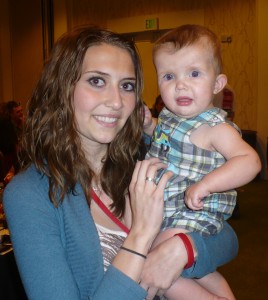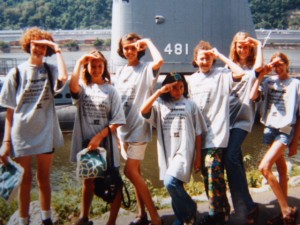Yesterday morning I opened Facebook to find a link to the latest blog post from one of my favorite special needs bloggers, Ellen. She wrote about how she’d love for her son Max, who has cerebral palsy, to have older role models with disabilities. Ellen went on to ask whether our children had special needs role models.
This got me thinking, both about Baby J and myself.
As I’ve written before, J will grow up within the Marfan community. He met his first Marf at a few weeks of age. I had teens volunteering from the get-go – even before he was born, actually – to take J under their wings as he gets older. For better or for worse, he is part of the Marfamily and will have no shortage of role models to show him how to live a happy, productive life.

This was not the case with me. Although my mother encouraged me as a young teen to write to my doctor inquiring whether any sort of support group existed, my parents waffled about me actually getting involved. My father was worried I might be scared at what older people with Marfan looked like, or get bogged down in negativity. My mother expressed concern over me identifying as a “Marf” and at my sadness every time a friend passed away.
These are concerns I hear echoed from other parents of children with Marfan as well.
To an extent, their concerns are valid. When you have a life-threatening illness, there’s going to be some negativity. Sometimes it’s scary. Your heart is going to get broken as people you’ve come to love lose their battles with the illness you share.
But despite all of this, making those connections is worth it. As parents, we can’t spare our children from pain. And as much as we think we understand what our children are going through, we don’t know. (I include myself in this, even as someone who will have a better idea than most about her child’s medical trials.)
Much of our youth is about trying to gain acceptance and having contact with other people like us gives up the opportunity to truly belong and feel typical, if only for a time. Surrounding ourselves with peers allows us to talk with people who really DO understand. Having access to older people who share our disability? That gives us hope. It’s one thing for our parents to tell us we’ll be ok, that we can get through this surgery or be successful in school. It’s another to see and talk with people who have actually made that journey and come through the other side better for it.
I hope that Ellen is able to connect Max with some teens or adults with cerebral palsy, and I hope the rest of you parents out there will consider helping your children make those connections as well. You won’t regret it!


6 Comments
Leave a reply →